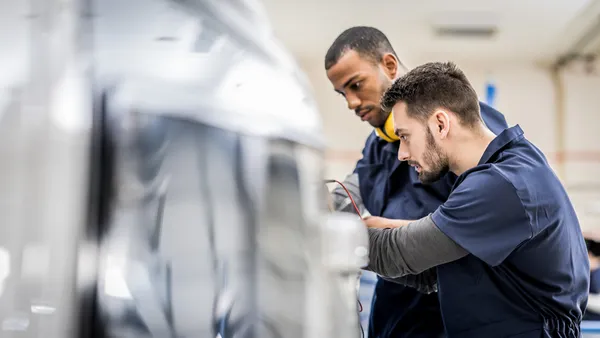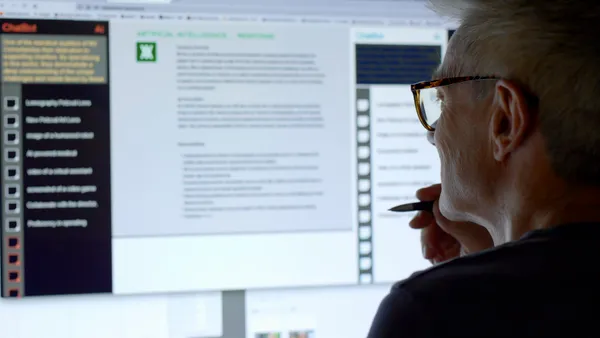Dive Brief:
- As HR professionals and corporate leaders plan for the future of their workplaces, a nationwide study by GE and global polling firm Ipsos found one pressing challenge — the disconnect between senior executives and entry-level employees over how companies represent their leadership mindset.
- Almost 90% of the more than 250 C-suite leaders responding to the survey say executive teams embody their leadership mindset, while fewer than 60% of the more than 400 entry-level employees who responded feel the same way. Views about leadership development also differ: Only 68% of entry-level employees feel as though their companies support their development as strong leaders, compared to 90% of C-suite leaders, the survey found.
- “In today’s rapidly changing business environment, entry-level employees value a clear vision and authentic communication from the C-suite,” Linda Boff, president of GE Foundation, stated in a Sept. 5 media release. For purposes of the survey, leadership mindset was defined as “the characteristics companies foster among employees to develop strong leaders who can help achieve business goals” and ensure the company’s long-term success. Both C-suite execs and entry-level employees identified quality, reliability, integrity and innovation as top characteristics for success.
Dive Insight:
While there are diverging views, most everyone surveyed seemed to agree on one point: 95% of C-suite executives and 81% of entry-level employees believe it’s important that leadership mindset is clearly communicated to all staff.
That alignment presents corporate leaders with a unique opportunity to “optimize both the definition and communication of this mindset within the company’s cultural context or framework,” Laura Cococcia, GE’s head of HR strategy, talent and culture, told HR Dive. Being intentional about how it’s done is a critical first step, Cococcia said.
Also, the person who is often the most effective at communicating a company’s leadership mindset is an employee’s direct leader, Cococcia added. “They not only provide situational context, but are also expected to role model the company’s leadership mindset and principles,” she said.
This coincides with a 2022 survey that found coaching is a key strategy for helping employees new to leadership roles develop skills needed to address cultural changes brought about by hybrid and flexible work. Businesses also saw potential in using coaching to improve employee well-being and bolster women leaders and inclusive leadership, the survey found.
“It’s essential for an organization to not just articulate its leadership mindset but to reinforce it through the actions of its leaders,” Cococcia emphasized. In other words, lead by example, “which is fundamentally about behaviors,” she explained.
Additionally, it’s vital to facilitate an open dialogue and establish channels for constructive, interactive feedback, Cococcia said. “This helps leaders continually refine engagement and communication strategies to ensure they resonate with all teams and insightfully evolve approaches if necessary,” Cococcia noted.
“Interestingly, our study found that more than two-thirds of entry-level employee respondents actively sought out information about their company’s leadership before joining the company,” and that played a role in their decision to join, Cococcia pointed out. For company leaders, this early engagement is an opportunity “to integrate and communicate their leadership mindset as part of the employer brand and value promotion,” she said.
HR Dive’s 2023 Identity of HR survey — an annual look at the state of the industry — revealed another disconnect. The survey, released in April, found that while HR professionals are well-regarded by employees, they say they’ve lost ground with corporate leaders.
To turn the tide, HR pros need to take more strategic risks, according to a credentialing expert. Being strategic means following the data, making recommendations based on research and learning to be comfortable swimming in unchartered waters, a CHRO said.
The events of the past two to three years may have both HR and corporate leaders doing just that — facing “the challenge and opportunity of leading through highly dynamic shifts in the workplace,” GE’s Cococcia observed.
“For example, the pandemic required leaders to make significant adjustments in the way they engaged teams, requiring constant agility and deep empathy. Relatedly, the digital transformation accelerated, heightening the need for leaders to reinforce a culture of continuous learning,” she said.
Emerging leaders — such as the 80% of entry-level employees who responded to the GE survey — see this as an opportunity for leadership training and development, which they view as a meaningful benefit, Cococcia pointed out.













